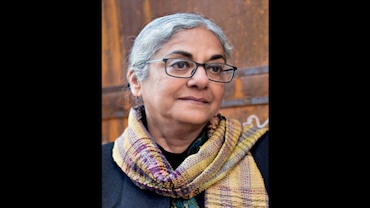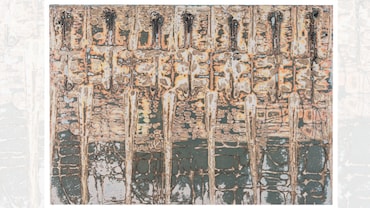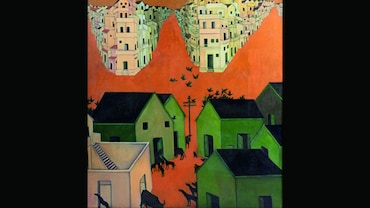- HOME
- /
- Culturescape
- /
Write To Be Free
Controversies pushed his back to the wall, but having won the 2020 JCB Prize for Literature, author S. Hareesh has vindicated himself and his writing
 Malayalam writer S. Hareesh has won the prestigious Rs 25-lakh JCB Prize for Literature.
Malayalam writer S. Hareesh has won the prestigious Rs 25-lakh JCB Prize for Literature.
In 2018, when a section from Moustache—the debut novel by Malayalam writer S. Hareesh—was first serialized as Meesha for a magazine, right-wing groups threatened him and called for boycotts. They found a small passage on temple-going women objectionable. Hareesh, who works in the revenue department, withdrew publication, but later that year the Supreme Court dismissed a plea to ban the work. Moustache has since won the prestigious Rs 25-lakh JCB Prize for Literature last month.
How did the novel Moustache take shape?
The main character, Vavachan, is based on a man who lived in my village. It is after hearing that this man had grown his moustache for the role of a policeman in a play and had refused to shave it off afterwards that I decided to write the novel. The other inspiration for the novel is the collection of folk songs known as ‘Chengannooradi’.
How do the land and landscape emerge as characters?
I was born and grew up in northern Kuttanad, Kerala—a place with several peculiarities. It is a place where the land was built up from lakes and swamps, where farming is done below sea level, a land that floods three times a year. Life here is amphibious, inextricably linked to its birds, fish and the agricultural calendar. From the time I began writing, I have wanted to write about this place. Vavachan’s story could not be told without also telling the story of the land. Pursued by his tormentors, it is to the labyrinthine land created by his ancestors that he escapes. I also have a special affinity to stories in which land itself is a character. We are embodied only through space and time.
Names, customs, allusions are very location-specific but the book does not overexplain. How should a novel like this translate its context and specifics to unfamiliar readers?
Meesha is not a book that allows for an easy read. Moreover, it is steeped in local life experiences, language, historical events and people. I must admit I was sceptical when the translation was proposed. But when Jayasree Kalathil sent me the draft of a chapter, all my scepticism vanished—she had done an excellent job. I think the decision not to include footnotes was an important one. It would have increased the book length by at least a 100 pages, and it would have also affected the flow of reading. So instead of that, [we] wrote introductory notes.
How did the muzzling attempt affect you? Do you wish you had done anything differently?
The attack on the novel was personally very hurtful. My hope as a writer is to have one’s work read without too much noise or drama. But in the case of Meesha, the opposite happened. As a result, I had to withdraw the novel, the owner of the magazine in which it was published had to apologize to the caste leader behind the controversy, the editor had to resign. Controversies are not good for books because they affect how they are read. But, despite all this, I have no intention of changing how I write, and I have no regrets. I think those who could not accept a story as a story are the ones who should feel regret.
Does the rise of intolerance concern you as a writer?
Absolutely. The increasing intolerance causes anxiety not just for me, but for everyone who wants to maintain a sense of honesty in their art and writing. Freedom is important for all human beings, not just writers and artists. It is only when life is bound by a sense of freedom that our thoughts and acts will lead to progress and development. As human beings, our effort should be to fight for more freedom, but it seems to me that the concern is to bring in more restrictions.
When you set a story so far back in the past, how do you ensure authenticity and accuracy?
It is not the job of the novel writer to record precise historical facts. If that was the intent, it is better to write a historical work. The attempt is to use historical material to write a work of fiction. C. V. Raman Pillai, Umberto Eco and others have done that.
Kerala—a state we associate with progressive values—is shown as imperfect, with violence, flooding, hunger. What are your thoughts on this contrast? How much of the past still lingers in Kerala today?
It is the influence of Christian missionaries that sets Kerala apart from the rest of India. They came here, learnt Malayalam, even wrote dictionaries and works of grammar. Their efforts in education changed the fabric of Kerala. Renaissance in other parts such as Bengal was helmed by the bhadralok (well-educated, prosperous class), but in Kerala it was Dalits and people of the lower castes who led such efforts. I feel that it was the fear of losing their position in the caste hierarchy that often instigated reformative efforts among the upper caste. From the outside, it might look as though Kerala has risen above caste-based thinking but surreptitiously caste works everywhere. It is part of Kerala’s reality. The ‘real’ Kerala is not the images in the tourist department’s adverts and calendars.
One jury member praised the novel as “unruly” with stories and characters moving in and out. How would you describe your storytelling style?
I am not sure if a particular style of storytelling is to be maintained throughout one’s writing life. For this particular novel, a style in which stories unfolded within and around stories seemed right. And that’s because Vavachan is a character that grows through the stories and songs other people make up about him. I felt a folkloric style was best suited to tell that story. Vavachan, or Meesha, is the unavoidable ingredient in the stories that people tell and retell.
What does winning the JCB Prize mean for your career?
Winning allows a writer freedom, but it also comes with responsibility. It is a unique pleasure to know that a jury of experts has validated one’s work, but it also challenges one to keep on renewing. Writers in regional languages rarely make a living out of their writing. Even in Kerala, there are only a few who can do that. I’d like to dedicate all my time to writing, but whether that would be possible is another question.






